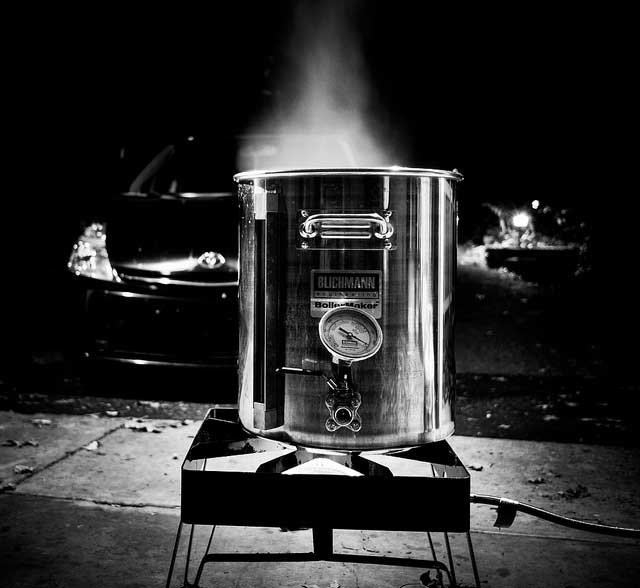Scholars argue that the demand for beer brought forth the first farming techniques and, later, the first refrigeration systems. Over time, brewers found ways to streamline processes, make their beers consistent, and drive demand for their products.
But today, in response to what has become a big-name brewer marketplace, a new, highly-profitable niche is springing up: The world’s beer buffs are homebrewing, creating new contenders in the fight for customer love.
The DIY mindset has taken hold of beer drinkers of all ages, and their money is coming straight out of the pockets of big names like Miller-Coors and Anheuser-Busch.
But how are homebrewers encouraging the public to go out of their way for their beers? How are they convincing customers that their shops are the best place to go for their needs?

Getting Them Hooked on Tonics
As a novice brewer, like many homebrewers, I purchased my first array of equipment from a website—where I also learned how to ferment. Then, looking for more, I dove into forums full of like-minded individuals.
I noticed that many of my beginner searches through forum threads yielded very helpful answers from a user named phillyhomebrew.
A few months later, I downloaded free software called “Beersmith,” which helps brewers keep track of their measurements and allows users to share recipes they create. When searching through the software, I stumbled upon a familiar username: phillyhomebrew.
Tracing the roots of this alias took me out of the web and into the streets of Philadelphia, where I found that phillyhomebrew is the username for a small shop called the Philly Homebrew Outlet. Two of Philadelphia’s own beer gurus, Jimmy and Nick, run this shop and use the homebrew threads in an online guerilla battle for customer engagement. They hop from site to site, answering everyone’s questions and providing useful advice, all while leaving their logo strewn across the web.
With 498 recipes posted and and hundreds of questions answered, phillyhomebrew supplies its customers (and the customers of many other homebrew shops) with a lot more than pots and grains.
If that weren’t enough, customers reach out to Jimmy and Nick with their questions or concerns about their brews. The phone in that shop has rung at least once every time I've been there… and they always answer. Why would I go anywhere else for my supplies?
R.E.A.P. What You Brew!
Jimmy and Nick from Philly Homebrew Outlet are great role models for up-and-coming businesses. These two beer masters score very highly on what we consider the four most important metrics for customer engagement.
1. Retention: Keep ‘em Brewing.
In their endeavor to help the brewers in their own homes, the gurus are doing much more than giving advice: they are ensuring their customers’ success. The best way to keep customers brewing is to have them enjoy their end result.
Speaking as a homebrewer who recently considered dumping 4 gallons of an unintentionally bitter ale down the sink, there is nothing more discouraging than failure. However, they explained to me exactly what I had done wrong and even encouraged me to stay optimistic and actually keep it as a sour ale. Flipping a negative experience into a positive one can be a very powerful weapon in the war against customer churn.
2. Effort: Give Them a Reason to Go Out of the Way to Get to You.
The way Jimmy and Nick make their guidance available online and over the phone might make you think there’s no need to come in to their outlet for supplies. However, their guidance makes customers feel like they’re working with a business that knows them and is aware of their progress and pitfalls. Listening and getting to know your customers individually can go a long way.
When customers think about traveling to that empty section of Philadelphia, there’s also the hope that they might offer them a sample of what he’s been brewing up the moment they walk in.
3. Advocacy: Enable Your Customer Base to Sell For You.
I would argue that sharing with your friends and family is half the appeal of homebrewing. Seldom do you see an amateur brewer hoard all of his or her product for themselves. Most drinkers would agree: after a few cold ones, you feel the urge to share.
A homemade beer with a friend often leads them to ask, “How did you make this?” To answer without mentioning the business that held your hand through the process would be a bit arrogant.
Of course, if you brew up an abysmal sour ale and dump it down the drain, you won’t be promoting anyone. Or worse, you may become a detractor and start blaming the shop for not helping you enough. These potential negatives point back to the need to provide positive customer experiences and the obligation to nurture your B2C relationship.
4. Passion: Condition Your Customers to LOVE your shop.
To love a business, you must first humanize the business. Not all stores can offer you a beer when you walk in. (There may be no better way to connect with your customers on a personal level.) However, if you have a handful of well-educated, engaged employees on staff to chat with clients and prospects, you’ll probably do just fine.

What It All Boils Down To
If there is one lesson to learn from Jimmy and Nick’s success, it is this: find your customers and engage. The Philly Homebrew Outlet’s online presence makes them easy to find for potential customers looking for help. You can also find them in the flesh at many tastings and competitions, where they remind beer aficionados that they can do it themselves. All of Philly Homebrew Outlet’s outings are well-documented on their Facebook and Twitter pages, in order to keep customers engaged, even if they’re sitting at home waiting for their homebrews to finish conditioning.
So what does that mean? Dive into the pot and start stirring up your customers! Standing idly by will not cut it in this age of customer-centricity. If you know where your customers are talking about you, then join the conversation. Let them know you care. At the very least, you can just ask them what they think! Most likely, they’ll be thrilled to tell you how they feel about your products, services, and employees.
Then, do something with the opinions you mash up—because those are the ones that matter. Don’t let them slip through your fingertips!
- "Beer sampler" by Quinn Dombrowski licensed by CC BY-SA 2.0
- "BoilerMaker" by fiftynightshades licensed by CC BY-ND 2.0





%20(1).png)